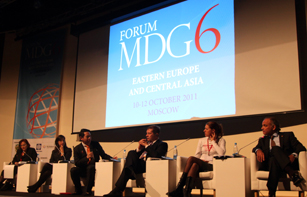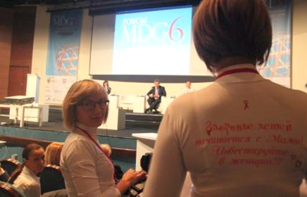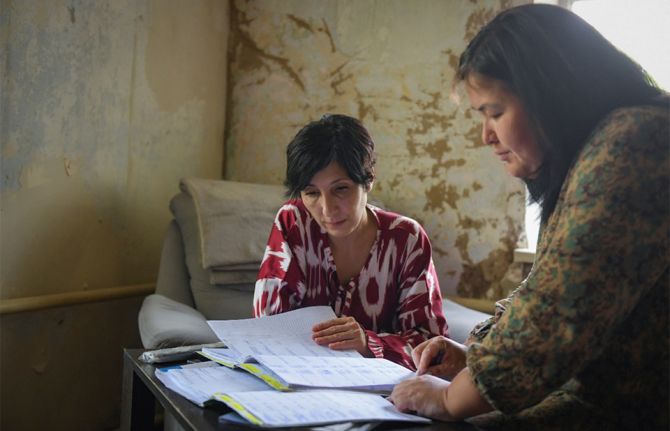
Feature Story
MDG-6 Forum addresses challenges faced by women and girls affected by HIV in Eastern Europe and Central Asia
13 October 2011
13 October 2011 13 October 2011
Panellists in the session included (from left to right): Nina Ferencic of UNICEF; Paige Alexander of USAID; James Chau, a UNAIDS Goodwill Ambassador; Mikhail Grishankov, a member of Russia’s State Duma; Dr Luiz Loures, Director of the UNAIDS Executive Office
Women, girls and HIV were the focus of a panel discussion on the final day of the International Forum on MDG-6 in Eastern Europe and Central Asia. Moderated by UNAIDS Goodwill Ambassador James Chau, the session included representatives from government, civil society and international development organizations.
Across Eastern Europe and Central Asia, the number of women infected with HIV is growing every year. In Russia, HIV prevalence among young women aged 15-24 is two times higher than among men of the same age, according to government figures.
Alexandra Volgina, an advocate for the Russian women’s network EVA, opened the session describing the key challenges faced by women and girls affected by HIV in the region. Stigma and discrimination, she said, continue to hamper access to HIV services and sustained availability of HIV treatment remains a major concern. Harm reduction programmes for women who inject drugs are insufficient, she added.
Ms Volgina was joined in the audience by women affected by HIV from across the region. Svetlana, a former drug user and mother of two, called for programmes that address the specific needs of women, including special treatment and care centres for women with children. “The birth of a child is a huge incentive for women using drugs to quit—but when these women seek help, we have nothing to offer,” she said.
Members of the regional networks highlighted the issue of violence faced by women within their own homes and communities. They also spoke of the pressure that many pregnant women living with HIV face to end their pregnancies. Several participants indicated that legal frameworks hinder access to much-needed care, including services that prevent new HIV infections in newborns.
Without political leadership and a united civil society, we will not be able to move ahead on this issue
Mikhail Grishankov, member of Russia’s State Duma and a longstanding advocate for women and girls
Women affected by HIV launched a campaign at the MDG-6 Forum with the slogan, “Children’s health starts from mom! Invest in women!” This theme was echoed in the remarks of UNICEF’s Nina Ferencic, who drew attention to the inextricable link between mother and child. “If you ask HIV-positive children what they want, they’ll tell you that—more than anything—it’s for their mothers to be alive and well. For a child to be healthy and happy, we need to first take care of the mother,” she said.
Panelist Paige Alexander of the U.S. Agency for International Development (USAID) said that putting a human face to HIV is what will drive change in the region. “We need to raise the face of women through all channels—by, for example, supporting women’s networks and women’s leadership,” she said.
Mikhail Grishankov, a member of the Russian Federation Parliament who has been working on AIDS issues for many years and a longstanding advocate for women and girls, called for greater cooperation between all stakeholders in addressing the needs of women in the HIV response. “Without political leadership and a united civil society, we will not be able to move ahead on this issue,” said Mr Grishankov, who also serves as Vice-Chair of an inter-parliamentary working group on AIDS and other diseases.

Sveta Izambaeva, member of the Russian Network of Women affected by HIV
Mr Grishankov also underscored the need for wider public awareness of HIV in Russia using various media channels. He committed to organizing a highly visible follow-up meeting between parliamentarians, women’s groups and HIV experts to review the immediate challenges faced by women affected by HIV in obtaining appropriate services.
“We need a fundamental change in the way that this region is responding to HIV,” said Luiz Loures, Director of the UNAIDS Executive Office. “If we want to make progress in this region, we need to look at the epidemic through a woman’s eyes,” concluded Dr Loures.
The International Forum on MDG-6, hosted in Moscow from 10-12 October by the Russian Federation, aimed to foster a strategic discussion on progress towards the Millennium Development Goal 6 in Eastern Europe and Central Asia. UNAIDS will ensure immediate follow-up to the Forum, engaging women’s organizations and partners.



